Hcs 212 exam 1 - Study guides, Class notes & Summaries
Looking for the best study guides, study notes and summaries about Hcs 212 exam 1? On this page you'll find 13 study documents about Hcs 212 exam 1.
All 13 results
Sort by
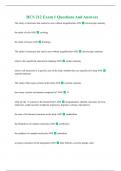
-
HCS 212 Exam 1 Questions And Answers Verified Study Solutions 2024/2025 Updates
- Exam (elaborations) • 38 pages • 2024
-
- $14.99
- + learn more
HCS 212 Exam 1 Questions And Answers Verified Study Solutions 2024/2025 Updates The study of structures that cannot be seen without magnification ANS microscopic anatomy the study of cells ANS cytology the study of tissues ANS histology The study of structures that can be seen without magnification ANS macroscopic anatomy refers to the superficial anatomical markings ANS surface anatomy refers to all structures in a specific area of the body, whether they are superficial or ...
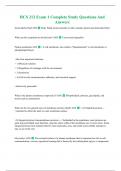
-
HCS 212 Exam 1 Complete Study Questions And Answers With 2025 Updated Solutions
- Exam (elaborations) • 64 pages • 2024
- Available in package deal
-
- $19.99
- + learn more
HCS 212 Exam 1 Complete Study Questions And Answers With 2025 Updated Solutions Extracellular fluid ANS Body fluids located outside of cells; includes plasma and interstitial fluid What can the cytoplasm be divided into? ANS Cytosol and organelles Plasma membrane ANS • A cell membrane; also called a *plasmalemma* or cell membrane or phospholipid bilayer • Has four important functions: > 1) Physical isolation > 2) Regulation of exchange with the environment > 3) Sensi...
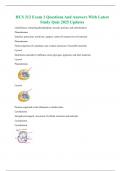
-
HCS 212 Exam 1 Questions And Answers With Latest Study Quiz 2025 Updates
- Exam (elaborations) • 14 pages • 2024
- Available in package deal
-
- $12.49
- + learn more
HCS 212 Exam 1 Questions And Answers With Latest Study Quiz 2025 Updates Lipid bilayer, containing phospholipids, steroids, proteins, and carbohydrates Plasmalemma Isolation; protection; sensitivity; support; control of entrance/exit of materials Plasmalemma Fluid component of cytoplasm; may contain inclusions of insoluble materials Cytosol Distributes materials by diffusion; stores glycogen, pigments, and other materials Cytosol
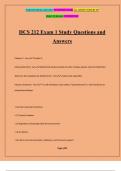
-
HCS 212 Exam 1 Study Questions and Answers
- Exam (elaborations) • 94 pages • 2024
-
- $12.49
- + learn more
HCS 212 Exam 1 Study Questions and Answers Chapter 2 - Ans:-Chapter 2 Extracellular fluid - Ans:-Body fluids located outside of cells; includes plasma and interstitial fluid What can the cytoplasm be divided into? - Ans:-Cytosol and organelles Plasma membrane - Ans:-• A cell membrane; also called a *plasmalemma* or cell membrane or phospholipid bilayer • Has four important functions: > 1) Physical isolation > 2) Regulation of exchange with the environment > 3) Sensitivity ...
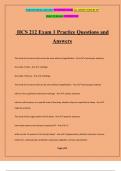
-
HCS 212 Exam 1 Practice Questions and Answers
- Exam (elaborations) • 54 pages • 2024
-
- $12.49
- + learn more
HCS 212 Exam 1 Practice Questions and Answers The study of structures that cannot be seen without magnification - Ans:-microscopic anatomy the study of cells - Ans:-cytology the study of tissues - Ans:-histology The study of structures that can be seen without magnification - Ans:-macroscopic anatomy refers to the superficial anatomical markings - Ans:-surface anatomy refers to all structures in a specific area of the body, whether they are superficial or deep - Ans:- regional anatomy T...
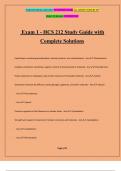
-
Exam 1 - HCS 212 Study Guide with Complete Solutions
- Exam (elaborations) • 13 pages • 2024
-
- $11.49
- + learn more
Exam 1 - HCS 212 Study Guide with Complete Solutions Lipid bilayer, containing phospholipids, steroids, proteins, and carbohydrates - Ans:-Plasmalemma Isolation; protection; sensitivity; support; control of entrance/exit of materials - Ans:-Plasmalemma Fluid component of cytoplasm; may contain inclusions of insoluble materials - Ans:-Cytosol Distributes materials by diffusion; stores glycogen, pigments, and other materials - Ans:-Cytosol - Ans:-Plasmalemma - Ans:-Cytosol Proteins organiz...
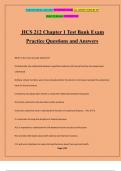
-
HCS 212 Chapter 1 Test Bank Exam Practice Questions and Answers
- Exam (elaborations) • 24 pages • 2024
-
- $12.49
- + learn more
HCS 212 Chapter 1 Test Bank Exam Practice Questions and Answers Which is the most accurate statement? A) Historically, the relationship between superficial anatomy and internal function has always been understood. B) Many cellular functions were known decades before the electron microscope revealed the anatomical basis for those functions. C) Anatomy has always been known to reveal the relationship between body parts. D) Ancient anatomists only described surface anatomy. E) Ancient anat...
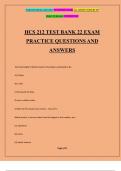
-
HCS 212 TEST BANK 22 EXAM PRACTICE QUESTIONS AND ANSWERS
- Exam (elaborations) • 31 pages • 2024
-
- $12.49
- + learn more
HCS 212 TEST BANK 22 EXAM PRACTICE QUESTIONS AND ANSWERS The total length of blood vessels in the body is estimated to be A) 30 feet. B) 1 mile. C) thousands of miles. D) over a million miles. E) None of the answers are correct. - Ans:-c Blood vessels, in correct order from the largest to the smallest, are: (1) capillaries (2) aorta (3) elastic arteries ©GRACEAMELIA 2024/2025 ACADEMIC YEAR. ALL RIGHTS RESERVED FIRST PUBLISH OCTOBER 2024 Page 2/31 (4) arterioles (5) muscular art...
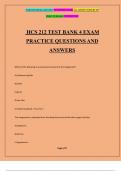
-
HCS 212 TEST BANK 4 EXAM PRACTICE QUESTIONS AND ANSWERS
- Exam (elaborations) • 27 pages • 2024
-
- $12.49
- + learn more
HCS 212 TEST BANK 4 EXAM PRACTICE QUESTIONS AND ANSWERS Which of the following is an accessory structure of the integument? A) sebaceous glands B) teeth C) gums D) ear lobe E) endocrine glands - Ans:-a The integument is separated from the deep fascia around the other organs by (the) A) epidermis. B) dermis. C) hypodermis. ©GRACEAMELIA 2024/2025 ACADEMIC YEAR. ALL RIGHTS RESERVED FIRST PUBLISH OCTOBER 2024 Page 2/27 D) cutaneous membrane. E) None of the answers are correct. - An...
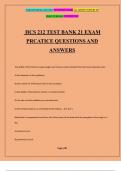
-
HCS 212 TEST BANK 21 EXAM PRCATICE QUESTIONS AND ANSWERS
- Exam (elaborations) • 30 pages • 2024
-
- $12.49
- + learn more
HCS 212 TEST BANK 21 EXAM PRCATICE QUESTIONS AND ANSWERS The ability of the blood to supply oxygen and remove carbon dioxide from the tissues depends upon A) the diameter of the capillaries. B) the number of white blood cells in the circulation. C) the ability of the blood to remain in constant motion. D) the rate at which platelets are manufactured. E) the osmotic balance, as controlled by the kidneys. - Ans:-c Blood that is transported to and from all of the tissues of the body with t...

How much did you already spend on Stuvia? Imagine there are plenty more of you out there paying for study notes, but this time YOU are the seller. Ka-ching! Discover all about earning on Stuvia


